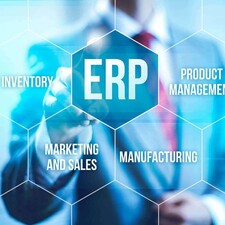Blog
ERP selection: The top 9 factors for the manufacturing industry

Summary
The environment of manufacturing companies is changing at a more rapid pace than ever before. Innovative production techniques, disruptive business models and volatile markets place increasing demands on companies: they must expand and produce more efficiently, implement new processes and bring products to market faster.
Under these difficult conditions, ERP selection is also gaining in importance - after all, a state-of-the-art ERP system is at the heart of your IT infrastructure, plays a key role in digital transformation, and is closely tied to the long-term success of the company.
Regardless of your industry or type of manufacturing, many questions of ERP selection are similar:
- How can we better connect warehouse and production?
- How do we implement customer-specific production efficiently?
- How do we control costs?
- How do we shorten lead times?
- How do we optimize quality assurance?
- How do we make good use of big data?
But the range of ERP solutions is extensive, and many med-sized companies feel overwhelmed with their ERP selection. Of course, "must-haves" such as integrated software, user-friendliness and a browser-based installation have become established across industries. But which features are indispensable for the manufacturing industry?
Write an effective RFP: download the Guide to Writing a Better ERP RFP:

We have put together a checklist for ERP selection with the ten most important ERP selection criteria:
ERP Selection Factor 1: The software is set up for your production type
Discrete, series or custom manufacturing - depending on the type of production, special functions may be necessary to accurately map processes in the ERP system. Businesses looking for ERP should therefore carefully analyze their choices to make sure the software they’re considering provides all the desired features by default, such as an extended workbench, growing bills of material or consignment stock. Otherwise, the implementation phase can be lengthened drastically by costly customizations, and a first-rate ERP system quickly becomes a cost trap.
ERP Selection Factor 2: The software accommodates detailed / advanced planning
Increasingly complex order networks, rush orders and growing number of variants require extremely efficient production control. When it comes to shortening make-ready times, avoiding delivery bottlenecks and making the most of machines and personnel, the classic PPS is reaching its limits - a problem that will be exacerbated in the development of the smart factory. In a dynamic manufacturing environment, an integrated APS (Advanced Planning & Scheduling) module becomes a must in ERP software selection to automatically adjust order sequences, taking into account real-time data from all departments.

Mobile capabilities can be a critical factor in a modern ERP selection process
ERP Selection Factor 3: The software can handle your logistics requirements
In particular, companies that work as suppliers to the automotive industry need more than just a classic industry suite. The high standards of uncompromising customer orientation, short lead times and on-time delivery can only be met by an ERP system that reflects just-in-time concepts and integrates the entire supply chain. Another important aspect of ERP selection for automotive suppliers is that the software enables manufacturer-specific logistics processes.
ERP Selection Factor 4: The software manages the full product life cycle
With ever-shorter innovation cycles, the expense of maintaining all the data related to product development also increases. That's why ERP systems that integrate efficient tools for Product Lifecycle Management (PLM) stand out when it comes to ERP selection. Advantage: The combination of the CAD data with the business processes in the ERP not only helps to manage the product data, but also increases transparency in all areas of the company. In this way, among other things, the manufacturing costs can be reduced and the quality of service can be improved.
ERP Selection Factor 5: The software transforms your data into usable insights
By the year 2020, it’s estimated that the Internet of Things (IoT) will include 50 billion networked devices. Using this growing amount of data strategically for process optimization and corporate control also becomes an important competitive advantage for medium-sized manufacturing companies. Companies should place a high value on professional BI tools in their ERP selection, looking for tools that filter, evaluate and process your collected data. State-of-the-art dashboards and custom reports provide key metrics and trends at the touch of a button, ideally without the need for the user to have programming skills.
Consider abas in your ERP selection. Check out our 2018 product brochure.

ERP Selection Factor 6: The software grows with you
Even medium-sized manufacturing companies are increasingly present in global markets. Whether you’re considering mergers or acquisitions, new production facilities abroad, additional project teams or overseas sales offices: to make a future-oriented decision in your ERP selection, the software must be easily scalable and easily adapt to the company's growth. Multi-site ERP systems speak different languages, calculate in different currencies and control consolidation for group accounting. Centrally managed information such as master data, inventory, orders and production schedules are available to all sites in real time.
ERP Selection Factor 7: The software offers an open architecture
Manufacturing companies rely on fast and easy data exchange with customers and suppliers. That means that the checklist for ERP selection should also include open interfaces and stable connectors. Only if external partners can be easily integrated into your ERP system through tools like vendor and customer portals, can complex and error-prone synchronizations be avoided.
ERP Selection Factor 8: The software makes your production mobile
With mobile apps, the ERP processes of almost all business units can be controlled on the go. In addition to proven mobile application areas such as purchasing, sales or warehouse, production processes are also relevant for manufacturing companies for a consistent mobile strategy. ERP for manufacturing should therefore support innovative shop floor applications and offer scanner solutions designed for industrial end devices.
ERP Selection Factor 9: The software provider is your partner, not just a vendor
There’s one item that bubbles to the top of just about everyone’s ERP selection checklist: the expertise of the ERP software vendor. An extensive feature list alone is no guarantee for ERP success. Only an ERP vendor that deeply understands the challenges of your industry today as well as in the future, will get the results you need to remain competitive.
Ready to talk?
Contact us today to set up a time to talk to an abas ERP rep about your ERP project.


